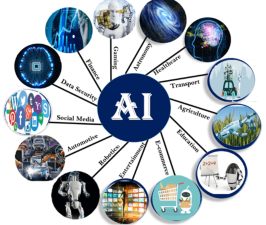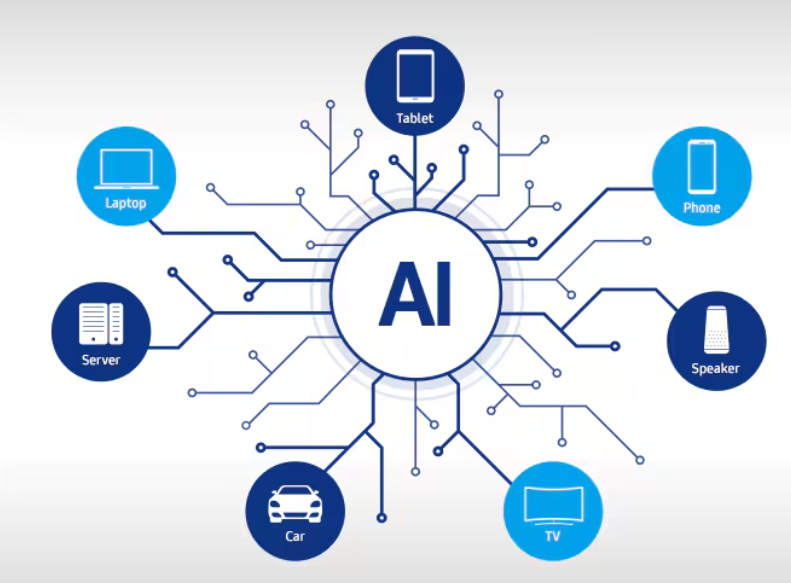“AI Everywhere” refers to the widespread and expanding integration of artificial intelligence (AI) in all areas of society and industry. It highlights how AI is increasingly embedded in products, services, and processes, becoming an essential tool for solving complex problems and improving operational efficiency. With ubiquitous AI, businesses can automate tasks, improve decision-making, and enhance customer experience. AI is being applied in various industries such as healthcare, finance, retail, and transportation. In addition, it is embedded in consumer products such as smartphones and home appliances to make daily life more convenient.
“AI Everywhere” refers to the widespread and expanding integration of artificial intelligence (AI) in all areas of society and industry. It highlights how AI is increasingly embedded in products, services, and processes, becoming an essential tool for solving complex problems and improving operational efficiency.
With ubiquitous AI, businesses can automate tasks, improve decision-making, and enhance customer experience. AI is being applied in various industries such as healthcare, finance, retail, and transportation. In addition, it is embedded in consumer products such as smartphones and home appliances to make daily life more convenient.
Trend-driven AI Everywhere

Edge Computing and AI Integration
Edge computing, the practice of processing data closer to where it is generated rather than relying on remote cloud servers, has become a key factor in the growth of AI. This trend allows for real-time decision-making, especially for AI-driven devices such as self-driving cars, drones, and industrial robots.
By reducing latency and bandwidth usage, edge computing improves the performance of AI systems. As industries such as healthcare, manufacturing, and logistics increasingly adopt edge solutions, we can expect more AI-driven innovations in these industries.
Advances in Machine Learning Algorithms
One of the main reasons why AI has become ubiquitous is the rapid development of machine learning (ML) algorithms. These algorithms allow machines to learn from data without explicit programming, with incredible improvements in accuracy, speed, and sophistication. Today’s AI models can perform tasks such as image recognition, language translation, and predictive analytics with incredible precision.
For example, deep learning (a subset of ML) has transformed fields such as autonomous driving, medical diagnostics, and financial forecasting. As these algorithms evolve, the potential for AI to solve complex problems and provide real-world solutions has grown exponentially.
Democratization of AI Tools and Platforms
A few years ago, AI tools were only accessible to well-funded tech giants. Now, thanks to the democratization of AI, small businesses, startups, and individuals can use AI tools to innovate and grow. Cloud-based AI platforms, such as Google AI and Microsoft Azure, provide affordable AI capabilities, including natural language processing (NLP), computer vision, and data analytics.
This shift has made AI a critical tool for small businesses, enabling them to compete on a level playing field and driving further AI adoption across industries.
AI Automation Across Industries
AI-driven automation is changing the way businesses operate. From customer service chatbots to AI-driven supply chain optimization, automation is reducing human intervention in repetitive tasks while increasing productivity and efficiency.
Manufacturing is a great example. With AI-driven robots, companies can now automate assembly lines, monitor machinery performance, and optimize production schedules in real time. Similarly, in industries like retail, AI is being used to predict demand, streamline inventory management, and even personalize marketing strategies based on consumer behavior.
The Growth of AI-Driven Analytics
Data has become the currency of the modern world, and AI is unlocking its full potential. AI-driven analytics enables organizations to extract deeper insights from large amounts of data to make smarter decisions.
For example, in healthcare, AI analytics are used to predict patient outcomes and personalize treatments. In finance, AI models help identify fraudulent transactions and optimize investment strategies. As more industries leverage AI-driven analytics, they can make data-backed decisions faster, improve efficiency, and become more competitive.
AI-Optimized Hardware and Networks
The growth of AI also depends on the development of specialized hardware and high-speed networks to support its data-intensive applications. AI models require massive computing power, which can put a strain on traditional infrastructure. This is where AI-optimized hardware comes into play, providing the computing power needed to run advanced AI algorithms.
Networking solutions, such as FS’s recently launched 800G Ethernet switches, are critical in this ecosystem. As AI becomes more pervasive, enterprises will increasingly rely on cutting-edge hardware and networking solutions to optimize performance and scalability.

How Enterprises Can Leverage AI Everywhere
Enterprises can leverage AI in every aspect of their operations to improve efficiency and innovation. Here are some of the key ways AI can be leveraged across the organization:
Automate routine tasks:
AI can streamline repetitive tasks, such as data entry, customer service, and logistics management. By automating these processes, companies can save time, minimize errors, and allow employees to focus on more strategic and valuable work.
Enhance decision-making:
AI can process large amounts of data and provide insights that help businesses make better decisions. For example, AI-driven predictive analytics can predict demand trends and optimize supply chains, allowing for more accurate planning.
Improve customer experience:
By analyzing customer data, AI can help businesses personalize interactions and provide tailored recommendations and promotions. AI chatbots can also provide fast and effective customer support, improving overall satisfaction.
Optimize operations:
AI can improve efficiency by optimizing processes and reducing waste. For example, AI-driven quality control systems in manufacturing can detect defects in advance, reducing material waste and production costs.
Innovative Products and Services:
AI enables the development of innovative products and services that were once out of reach. For example, AI digital assistants can help people with disabilities complete tasks that were previously challenging or impossible.
To integrate AI throughout their business, companies should first identify key challenges and opportunities where AI can provide the most value. Partnering with technology providers and AI experts can help tailor solutions to meet specific business needs and goals.
The Future of Ubiquitous AI
The future of “ubiquitous AI” is filled with exciting advances and great potential. Here’s where AI is expected to evolve over the next few years:
• Wider Applications:
As AI technology advances, we will see its widespread adoption across industries and applications. This will be driven by growing recognition of AI’s benefits and the continued expansion of AI tools and solutions.
• Improved AI Algorithms:
AI algorithms will continue to become more accurate and efficient, enabling AI systems to make better decisions, solve more complex problems, and operate with greater autonomy.
• Integration with Other Technologies: AI will increasingly merge with other emerging technologies such as the Internet of Things (IoT), 5G, and cloud computing. This will open up new possibilities for AI to add value to businesses and consumers.
• Increased Regulation:
As AI becomes more prevalent, it is expected that regulation around its use will increase. These regulations will ensure responsible and ethical use while protecting consumers and businesses from potential risks.
• New AI Applications:
As AI continues to advance, we can foresee the development of innovative new applications. For example, AI could be used to improve urban planning, optimize energy consumption, or improve the performance of sports teams.
In summary, the future of ubiquitous AI is promising, with many exciting innovations on the horizon. However, the expansion of AI also requires careful consideration of its ethical and societal impacts, as well as continued investment in research and development.

